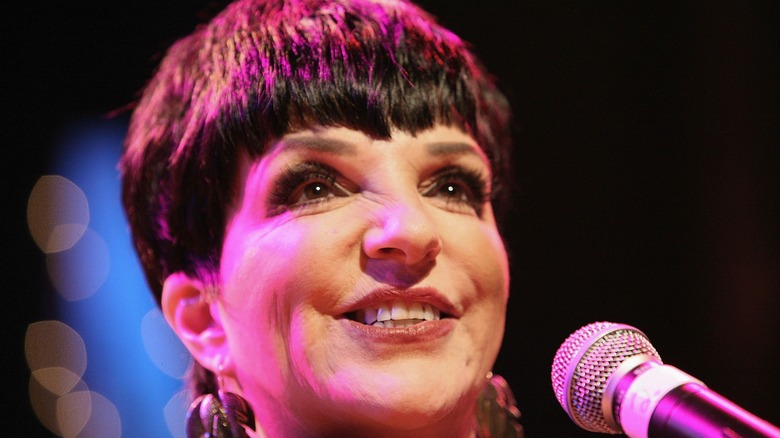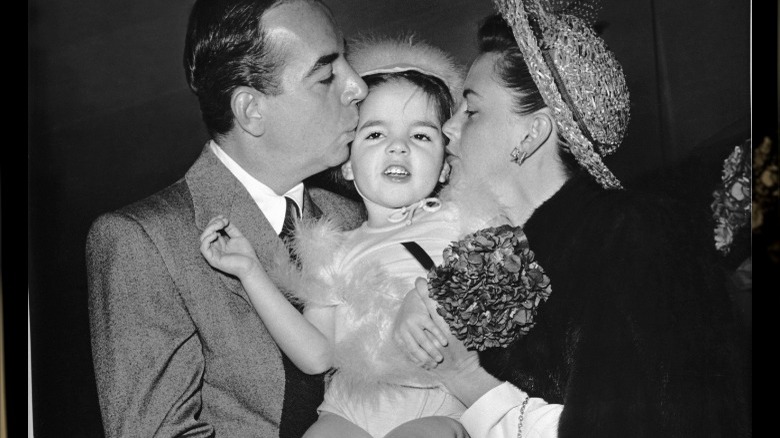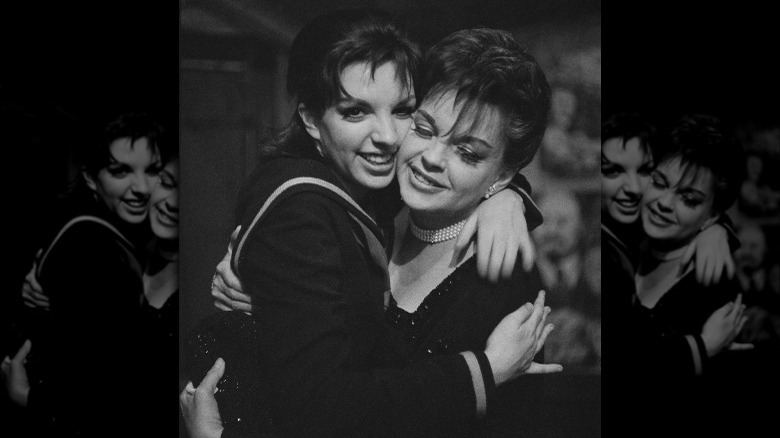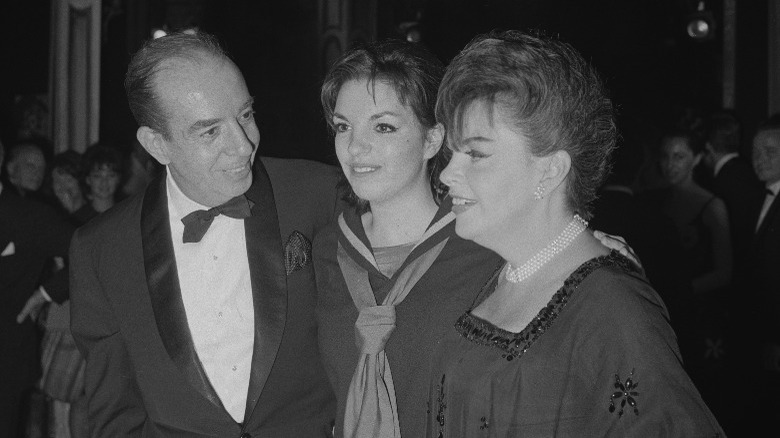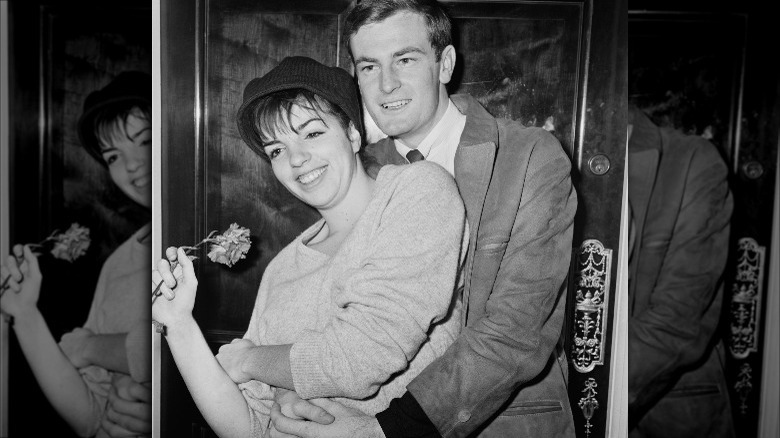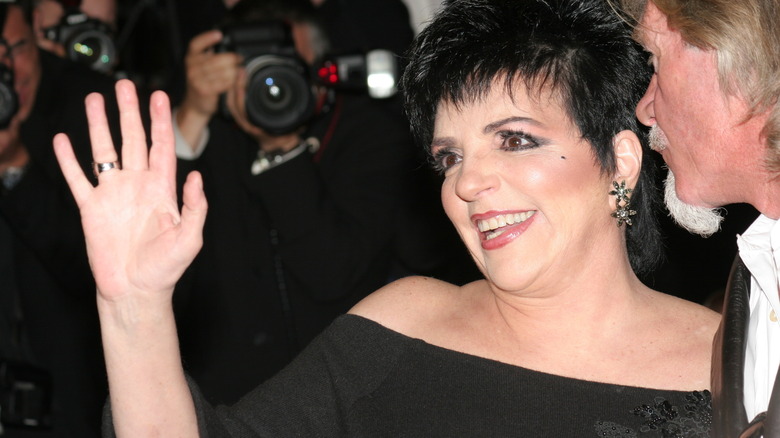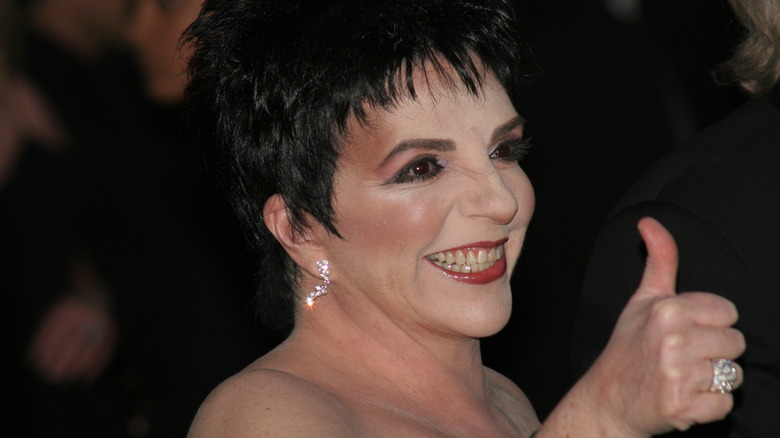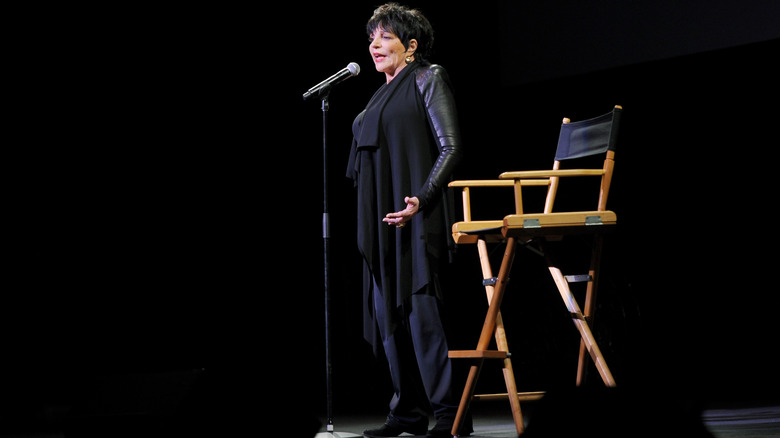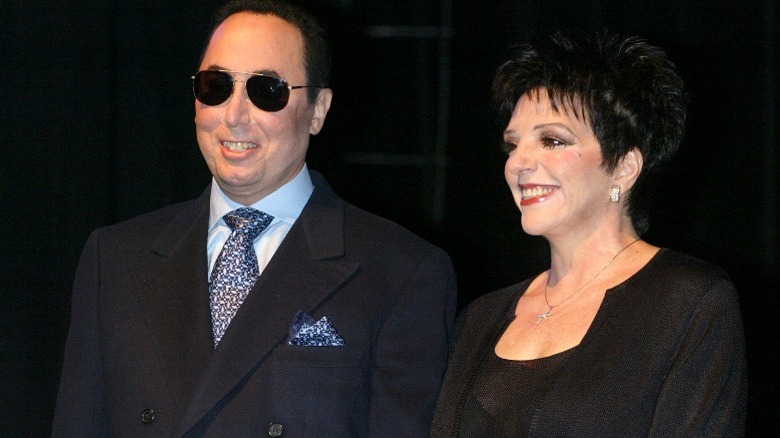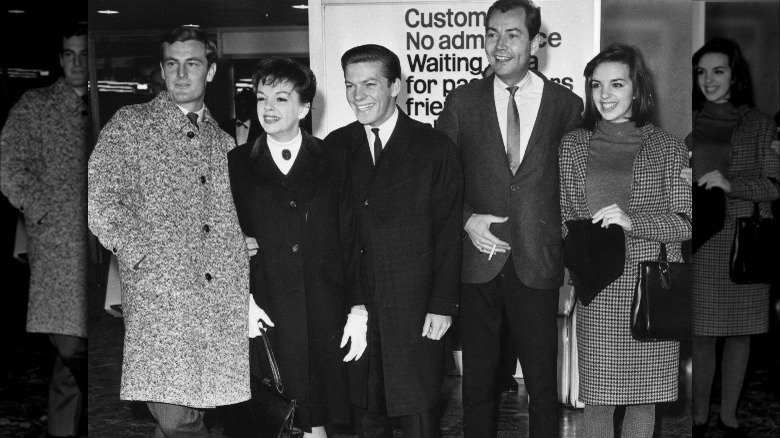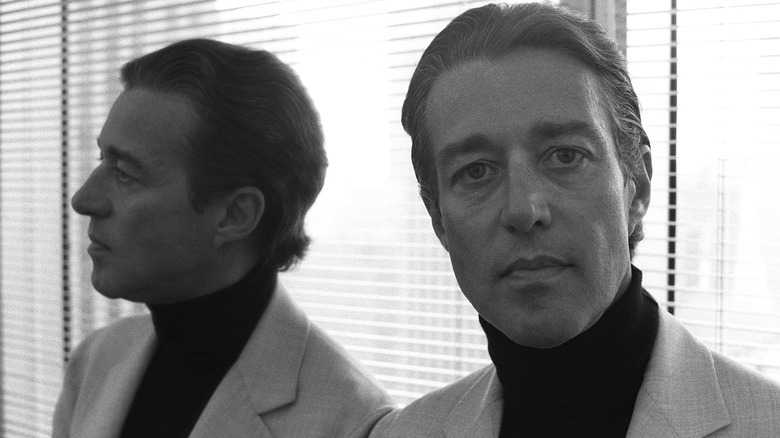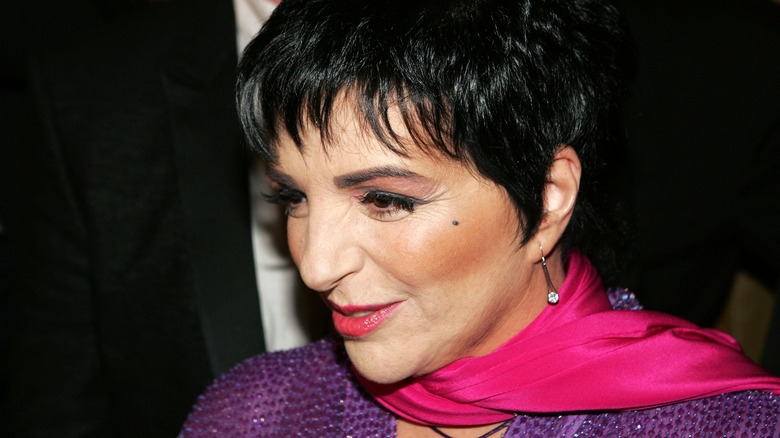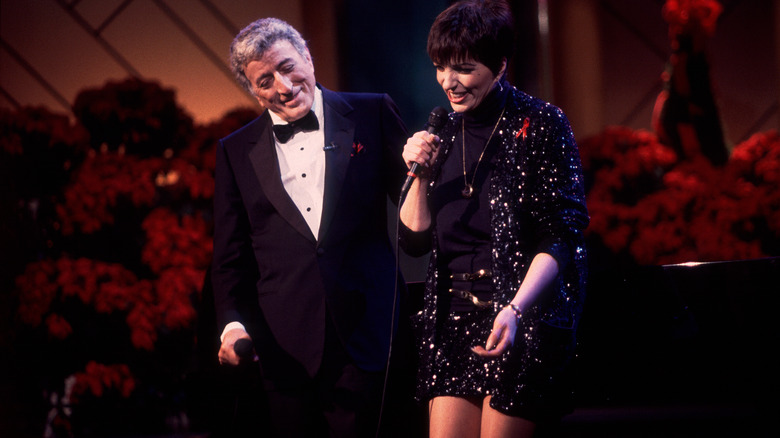The Tragic Real-Life Story Of Liza Minnelli
There are the biggest, trendiest stars of the pop culture world, and then, there's Liza Minnelli. She's instantly recognizable with her trademark black hair and pixie cut, and somehow, it only adds to the illusion that she's a timeless creature from some other world. Even when she was young — and starring in things like "Cabaret" — she was one of those stars who always seemed to have been plucked from another time ... one where the world was still in black and white, and the stage lights were always turned down low.
And it's no wonder — Minnelli was born into one of show business' royal families. Her mother was, of course, the legendary Judy Garland — who was, in addition to being famous as Dorothy from "The Wizard of Oz," was also the poster child for the system of abuse that was rampant in Old Hollywood. That's important, because it's impossible to talk about Minnelli without talking about her mother. Her father — Vincente Minnelli — was just as famous behind the camera as a director, and although her parents split early on, Minnelli famously remarked (via The Guardian), "They married again so many times I have millions of parents."
From "Cabaret" to her role as Lucille 2 on cult favorite "Arrested Development," Liza Minnelli has been larger than life for, well, her entire life. But that hasn't come without some major lows, though, and learning about the tragedies that she's struggled with behind the scenes gives us a whole new appreciation for this incredible star.
Liza Minnelli was her mother's keeper
Liza Minnelli is the daughter of Judy Garland, and while it might seem like that's a ticket to stardom, it came with a ton of baggage. Hollywood's mistreatment of Garland (and other young stars) is the stuff of legend, and years of abuse left her in fragile mental and physical health at a young age (as noted in Timeline). Once Minnelli was old enough to help, she became responsible for her mother.
While Garland struggled with addiction to amphetamines and barbiturates, her daughter kept an eye on her. Minnelli's former husband, Peter Allen, explained to Rolling Stone, "When she was a kid, a doctor told her that Judy could not take more than a couple of Nembutals [a depressant and sleep aid] a day, that more might kill her, but that she had to believe she was taking more, so it was up to Liza to empty out more of the capsules and fill them with sugar."
Minnelli recalled it was a normal thing for her mother to lock herself in the bathroom after announcing that she was going to overdose, but "all she wanted was attention!" Minnelli insisted. "To Mama, it was all funny, always."
Although there were good memories, and Minnelli did love her mother, it wasn't all a picnic. She admitted, "... she could be a terror. I got used to her tantrums, scenes. Though now I ... still can't stand to hear anybody yell. ... Screaming, fighting, I will run from it at any cost."
There was no silver spoon ... not really
Liza Minnelli was born in 1946 (via Biography), and by the late 1960s, her mother was destitute and, says Refinery 29, supporting them by performing in bars for $100 a night. It was about the same time she said in an interview, "Do you know how difficult it is to be Judy Garland? And for me to live with me? I've had to do it — and what more unkind life can you think of than the one I've lived?"
By the time Minnelli was 21, she'd been kicked out of hotels for an inability to pay, and she'd been homeless, sleeping in Central Park and on the Plaza Fountain. When she talked to Rolling Stone, she recalled, "we had to sneak out of hotels because she was out of bread, and she would make an incredibly funny game out of it." They'd put on all the clothes they could wear and head out before the bill came due, with Garland reassuring her daughter that she'd "needed a new wardrobe anyway."
When it came to starting her own career, Minnelli was on her own, talking herself into off-Broadway productions, and getting experience touring with her mother, as "duenna [governess] and crying towel." And when it came time to set out on her own path, her famous background became her biggest obstacle. She told Variety, "The hardest part was getting to be known as myself as opposed to somebody's daughter."
She cried only once
Judy Garland died in 1969, when she was just 47 years old. The official cause was an overdose of barbiturates, and in the end, things were bad. Her manager, Stevie Philips, told Inside Edition, "... she was in enormous emotional pain. ... Being with her was like being on a roller coaster. It took drugs ... to get her back to a level place where you could have a conversation with her."
It fell to 23-year-old Liza Minnelli to not only console Garland's fifth husband, Mickey Deans, but to grieve her mother's untimely death in a very public place. According to Rolling Stone, she only permitted herself to cry once — in the car, on the way to Manhattan, after getting the news.
It was Minnelli that stood up to the massive pressure to have a very public funeral and instead decided it was going to be a private, somber ceremony with only yellow roses and help from an MGM make-up man who had worked with her mother in the past. (Eva Gabor then refused to let the make-up artist leave for the funeral, saying she needed him for her work on "Green Acres.")
Minnelli was also confronted with a daunting realization — everyone was going to be writing a book about her mother and telling their versions of stories that she didn't necessarily agree with. And that's when she knew that she had to set the record straight with her own book, written as only a beloved daughter could write.
Being the breadwinner ruined her marriage
On March 4, 1967, The New York Times ran a tiny blurb about Liza Minnelli's very private first marriage to singer-songwriter Peter Allen. It was a rocky union, though, and there were a few reasons for that — including, says Vice, the fact that he was gay.
There was more to it, though, and when Minnelli shared some of the behind-the-scenes details with Rolling Stone, she said that one of the biggest issues they had was that her career was taking off, and his wasn't. She was, after all, riding high on the success of "Cabaret," and she said that for Allen, that was a tough thing to deal with.
At the time, she says women were still very much groomed to believe that they needed to get married, settle down, and "ride off into the sunset." It wasn't for her, though, and in spite of the fact that Allen was always a good friend, her success got in the way. "You're married, a guy's career goes well, swell, but the girl's does and his doesn't and it's panic time. ... He'd say, 'You never come home anymore to cook supper.' I'd say, 'I have to work to make the money to buy the food to cook the supper,' [and] he'd say, 'I'm the man, I should be making the money ...'"
The marriage would end in 1974.
An insight into how complicated fame is
At one time or another, most people wonder what it would be like to be famous. Liza Minnelli has never known anything different, and told Variety, "I was born, and they took a picture."
And it's not always all it's cracked up to be, either. When Minnelli spoke with The Guardian in 2008, reporter Emma Brockes got an interesting glimpse into what it was really like. For starters, Brockes noticed that Minnelli was very well aware that anything she said or did might be "used against her to prop up the image of Judy Garland's Tragic Daughter," and in defense of that, she created the persona she's so well-known for.
They were having lunch at the Plaza, and were — predictably — approached pretty regularly. That included when they were sitting on the steps outside, and Minnelli acknowledged a man standing a good distance away, and simply staring. Brockes hadn't even noticed him, and when she said as much, Minnelli responded, "I grew up watching, to protect Ma. You know. I can see them coming."
That's a pretty heartbreaking glimpse into the childhood of someone always on the lookout, but at the same time, Minnelli says it's not "annoying." She continued, "I mean, it's funny when they're opinionated, but at least they're coming over. My God, what if they didn't come over?"
Liza Minnelli suffered through multiple miscarriages
Details on Liza Minnelli's miscarriages are understandably scarce. It is, after all, a deeply personal and tragic event that changes a person for good, and when she spoke with The Guardian in 2008, she mentioned one of the babies she lost — and even years later, the tone of the interview immediately shifted to incredibly somber.
In the interview, she revealed that she was unable to eat before performing. "I have a hiatal hernia, which I got when I was pregnant and they put me upside down, trying to hold the baby — and the baby passed away anyway."
Minnelli quickly changed the subject but has spoken about how much she regretted never having children, how devastating the loss of her pregnancies were, and how deeply it affected her. When The New York Times reported on her 1981 miscarriage with then-husband Mark Gero, they said she was understandably, "profoundly grieved," that their miracle had ended in tragedy. All together, Minnelli suffered three miscarriages before accepting that she would never have children, telling SAGA, "It's one of my life's true regrets."
She's done her time at rehab
When Liza Minnelli's first husband, Peter Allen, spoke to Rolling Stone about her relationship with drugs and alcohol, he said, "She won't even take aspirin." Seeing her mother spiral into addiction took a toll on her, but according to NBC News, things changed after Judy Garland's death in 1969. That's when doctors prescribed Valium to help Minnelli sleep, and that's when her own addiction to pills and alcohol began.
They reported that she had spent time at several rehab facilities over the years, and Minnelli has always been upfront about it. She told The Guardian, "My whole life this disease has been rampant. I inherited it, and it's been horrendous, but I have always asked for help."
Minnelli, says ABC, didn't take her first drink until she was 30 years old. Afterwards, she fell deeper and deeper into the combination of drugs and alcohol, and according to her half-sister, things got so bad that not only did she have to "kidnap Minnelli to save her" in 1984, but that Frank Sinatra even got involved. He loaned the sisters his plane, in order to make sure Minnelli arrived safely at the Betty Ford Clinic.
She's struggled to make sense of her addiction, saying, "Nobody would do that, if they had seen the things that I had seen — unless they couldn't help it. ... This is a disease, and the sooner we know that, the better."
Liza Minnelli vs. David Gest
When concert producer David Gest first hooked up with Liza Minnelli, there were a ton of rumors. Front and center, says The Washington Post, is that he was more interested in her money than in her, but still, they married in 2002. They split just 16 months later — and it wasn't just a split, it was one of the most dramatic, hateful divorces in recent Hollywood history.
Along with the split came a $10 million lawsuit against Minnelli. Gest claimed that she had physically abused him so badly he'd been sent to the hospital, saying she "kept hitting me in the head with her fists ... The pain was so enormous that I get now 80 shots around the head to deaden the nerves." He also claimed that the attacks left him suffering from headaches, vertigo, insomnia, and hypertension, and that along with those shots he needed 11 daily medications to deal with the pain.
Minnelli countersued and accused him of not only stealing from her, but that living with him had left her "afraid for her life," (via The Guardian), as she claimed he had been poisoning her.
Divorce proceedings continued for about another four years and ultimately ended with a no-fault divorce and Minnelli swearing she was never, ever going to get married again. "If you even hear I'm getting married, hit me over the head and take me outta there!"
Like mother, like daughter ... even in the men they chose
There's another running theme through the lives of Liza Minnelli and Judy Garland, and it's complicated. According to Biography, Judy Garland's father, Frank Gumm, was — way back in the 1920s — frequently found in the company of men. Garland went on to marry director Vincente Minnelli, who biographers say was bisexual — adding that Garland had once attempted suicide after finding him with another man.
Liza Minnelli's relationships paralleled those of her mother in strange ways. According to Vice, she realized very, very soon after getting married for the first time that her husband was gay — the story goes that it was their wedding night when she caught Peter Allen with another man.
That wasn't the end of it, though, and Allen went on to have an affair that is exactly the sort of thing that tabloids love — he hooked up with Mark Herron, who was the husband of none other than Judy Garland.
Ultimately, Judy Garland was married five times, and her daughter was married four. None of the marriages were super happy.
Her fierce devotion to Halston
Having a best friend can make life complete, and when it comes to Liza Minnelli, her best friend was the fashion designer Halston. Not only did they have a fantastic working relationship — he designed her most memorable clothes, and she was always front and center if he needed a model — Minnelli says (via Vanity Fair), "[Halston] was my big brother. I loved him. I trusted him." She's had nothing but shining praise for him, remembering that some of the best times she spent with him were just hanging out, grabbing a bite to eat, and listening to each other.
Tragically, their friendship ended too early. Halston, the Associated Press says, had retired in 1988 and was diagnosed with AIDS the following year. By March 1990, he was dead.
Minnelli organized a tribute to him, saying, "I'll miss him always." And, in the years since, she's been an unfailing protector of his legacy, even meeting with Ewan McGregor before the filming of Netflix's "Halston."
More than that, NAM says she led the charge in the fight not just against AIDS and HIV but in the stigma that goes along with it. She has done a massive amount of charity work and was honored with the International Hero Award in 2003, saying, "I will do anything in this fight to help find a cure for this devastating disease. ... We have a long way to go ... and I will always be a part of that battle."
Liza Minnelli was nearly paralyzed by a potentially deadly disease
In 2000, paramedics were summoned to Liza Minnelli's Florida home and found that she seemed to be suffering from what was first thought to be a severe stroke (via CBS). It was actually complications from something called viral encephalitis — contracted through a mosquito bite — and it's terrifying stuff.
Encephalitis refers to an inflammation of the brain, and the Mayo Clinic says that severe cases are life-threatening. Symptoms range from paralysis and seizures to difficulty speaking, hallucinations, and coma. And Minnelli? She was told that she was never going to walk again, and that the dancer needed to accept she was going to be reliant on a wheelchair.
She had other ideas and ultimately made a full recovery. It was anything but easy, though, and she told The Guardian, "I had to learn to walk again, had to learn to talk again. People don't usually recover like I recovered, but I would not give up. ... I was lying there, scared, and my father always told me, 'The way you do something is you think about it.' ... I really worked to get back."
Liza Minnelli has had many, many surgeries
Watch Liza Minnelli dance, and it looks like what she was born to do. It's taken a severe toll on her, though, and she's had to undergo numerous surgeries and procedures to keep on her feet.
According to SAGA, she's fond of saying, "I'm Dorothy's daughter up top and the Tin Man down below," and she's not exactly exaggerating. She's also said (via Strauss Scoliosis Correction) that her problems went back a long way, and that for a long time, she didn't even realize that she was unconsciously adjusting the way she walked and moved to relieve the pain of her scoliosis. (She only noticed it when she saw someone impersonating her and her distinctive walk.) Given that, it's not entirely surprising that in 2014, it was reported, as per Billboard, that she was recovering from back surgery.
In addition, she's suffered from crushed discs in her back, has had two hip replacements, and a knee replacement. She called the knee replacement "quite traumatic" but also added (via Music News) that less than a year later, she was once again dancing every day.
